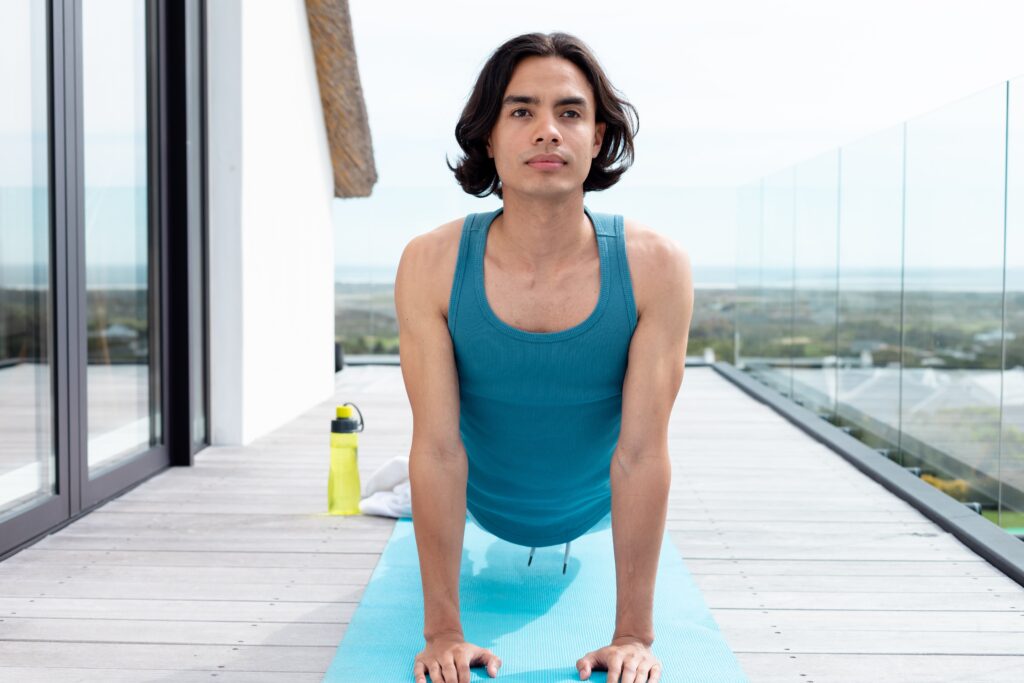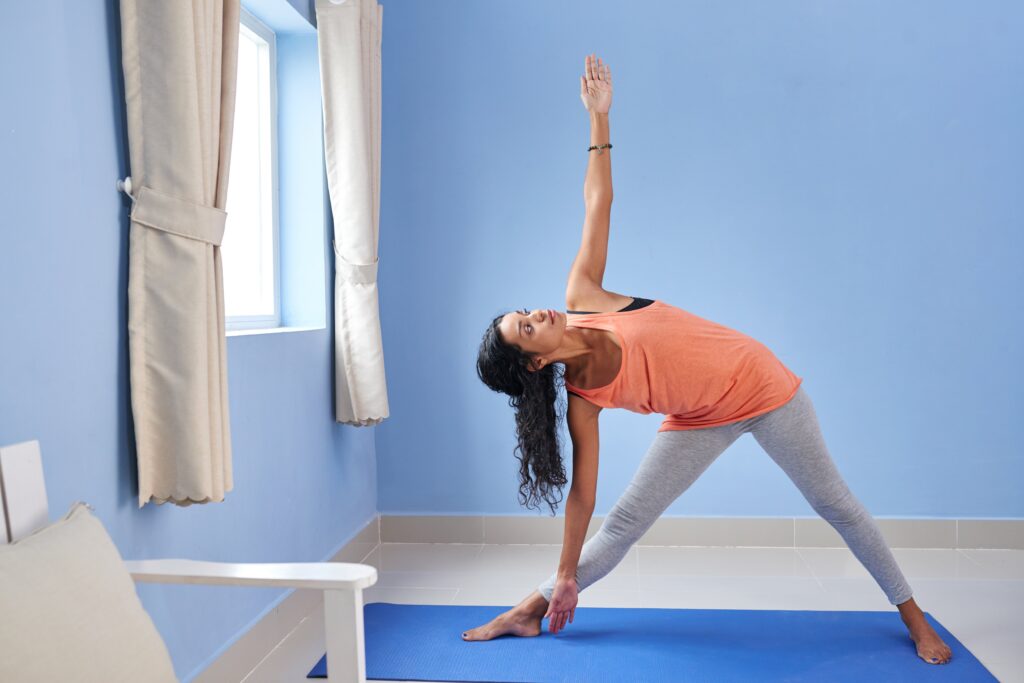Iyengar Yoga
Iyengar Yoga
At SuryaMandalaYogashala, we take pride in offering exceptional Iyengar Yoga classes in Mysore, tailored to meet the needs of both beginners and seasoned practitioners. Experience the profound benefits of our yoga classes in Mysore and elevate your practice to new heights. Iyengar Yoga traces its roots back to the teachings of the ancient sage Patanjali and was popularized in the 20th century by B.K.S. Iyengar, who began teaching in the 1930s. His innovative approach to yoga was influenced by his own struggles with health issues, which drove him to explore the physical and therapeutic aspects of yoga. By emphasizing alignment and the use of props, Iyengar made yoga accessible to people of all ages and abilities.

Key Principles of Iyengar Yoga
- Alignment: Proper alignment is fundamental in Iyengar Yoga. Practitioners learn to position their bodies in a way that maximizes the benefits of each pose while minimizing the risk of injury.
- Props: The use of props such as blocks, straps, and blankets is a hallmark of Iyengar Yoga. These tools support practitioners in achieving the correct alignment and help make poses more accessible.
- Sequencing: Iyengar Yoga classes are carefully sequenced to build strength, flexibility, and stamina progressively. This thoughtful arrangement of poses allows practitioners to experience the full benefits of each asana.
- Sustained Poses: Poses are held for longer durations compared to other styles of yoga. This sustained practice helps deepen the understanding of each pose and creates an opportunity for introspection.
- Focus on the Breath: Breath control (pranayama) is integrated into the practice, enhancing the connection between the body and mind.
The Benefits of Iyengar Yoga
Physical Benefits
- Improved Flexibility: A study published in the Journal of Physical Therapy Science found that individuals who practiced Iyengar Yoga experienced significant improvements in flexibility. Regular practice helps lengthen muscles and increase the range of motion in joints.
- Enhanced Strength: Iyengar Yoga builds strength through various poses that engage multiple muscle groups. Research indicates that participants who practiced Iyengar Yoga for 12 weeks experienced improved muscle strength, particularly in the lower body.
- Postural Alignment: One of the primary focuses of Iyengar Yoga is to promote good posture. According to the American Chiropractic Association, poor posture can lead to chronic pain and discomfort. Iyengar Yoga teaches practitioners how to align their bodies correctly, which can alleviate tension and reduce the risk of injury.
- Balance and Coordination: The practice enhances balance and coordination, which are crucial as we age. A study published in the Journal of Aging and Physical Activity revealed that older adults practicing Iyengar Yoga showed improved balance and stability.
Mental and Emotional Benefits
- Stress Reduction: Iyengar Yoga encourages mindfulness and relaxation, making it an effective tool for stress management. A study in the International Journal of Yoga found that participants reported reduced anxiety and stress levels after engaging in Iyengar Yoga classes.
- Increased Focus and Concentration: The emphasis on alignment and breath control fosters a heightened sense of awareness. According to research conducted by the University of California, Berkeley, mindfulness practices, including Iyengar Yoga, can enhance cognitive function and improve attention span.
- Emotional Resilience: Regular practice helps cultivate emotional resilience, allowing individuals to cope with life’s challenges better. Participants in a study published in the Journal of Clinical Psychology reported improved mood and emotional well-being after practicing Iyengar Yoga.
- Mind-Body Connection: Iyengar Yoga promotes a deep connection between the body and mind. This integration can lead to greater self-awareness and a more profound sense of inner peace.
Techniques and Practices in Iyengar Yoga
Common Asanas (Postures)
- Tadasana (Mountain Pose): This foundational pose teaches alignment and balance, serving as a starting point for many other poses.
- Adho Mukha Svanasana (Downward-Facing Dog): This pose helps strengthen the arms, legs, and back while promoting relaxation and focus.
- Virabhadrasana (Warrior Pose): Warrior poses build strength and stability, enhancing confidence and focus.
- Savasana (Corpse Pose): Often practiced at the end of a session, Savasana promotes deep relaxation and allows the body to absorb the benefits of the practice.
Breath Control (Pranayama)
Pranayama, or breath control, is an integral part of Iyengar Yoga. Practitioners learn to synchronize their breath with movement, fostering a deeper understanding of their bodies. Techniques such as Ujjayi (victorious breath) and Nadi Shodhana (alternate nostril breathing) are commonly taught to enhance vitality and clarity of mind.The Role of Props
Props are essential in Iyengar Yoga, allowing practitioners to achieve proper alignment and stability. Common props include:- Yoga Blocks: Help in modifying poses for accessibility.
- Straps: Assist in achieving correct alignment, especially in poses that require flexibility.
- Bolsters and Blankets: Provide support and comfort during restorative poses.
The Impact of Iyengar Yoga on Holistic Health
Therapeutic Applications
Iyengar Yoga has been recognized for its therapeutic benefits, making it a valuable tool for individuals dealing with various health conditions. Research has shown that Iyengar Yoga can aid in managing:
- Chronic Pain: Studies indicate that Iyengar Yoga can alleviate chronic pain conditions such as lower back pain and arthritis.
- Mental Health Disorders: A systematic review published in the Journal of Clinical Psychology found that yoga, particularly styles like Iyengar, can be effective in reducing symptoms of depression and anxiety.
- Cardiovascular Health: Iyengar Yoga has been linked to improved cardiovascular health. A study in the European Journal of Preventive Cardiology found that participants who practiced Iyengar Yoga experienced reduced blood pressure and improved heart rate variability.
Embracing Diversity
Iyengar Yoga is inclusive and adaptable, making it suitable for individuals of all backgrounds and abilities. The use of props allows those with physical limitations to participate fully in the practice, promoting a sense of belonging and community.
Enjoy The Best Experience with Us
Join our Iyengar Yoga classes in Mysore and embark on a transformative journey that harmonizes body, mind, and spirit through the art of Iyengar Yoga. Experience the profound benefits of our yoga classes in Mysore and elevate your practice to new heights.



